Tuesday's suicide attack at Istanbul's Ataturk airport, that killed at least 42 people and wounded nearly 250, highlights how far Turkey has fallen from its former status as a regional example of stability.
Terror attacks have been growing across Turkey, with several targeting Istanbul — a city historically considered the meeting place of the European and Asian continents.
With its once thriving economy and robust tourism sector, the country’s financial boom has now gone bust. Tourist arrivals are down about one-third this past year.
There has been no claim of responsibility for the latest incident, but Turkish prime minister Binali Yildrim said Tuesday’s attack seemed to have the hallmarks of an Islamic State operation.
It almost mirrored the March 22 attack claimed by IS on the international airport in Brussels that left 32 people dead.
The Institute for the Study of War had predicted an increase in IS attacks in Turkey during the Islamic June 5-July 5 holy month of Ramadan,as part of the extremist group’s attempt to reorient its strategy in the region.
“ISIS will likely select targets in neighboring states that relieve pressure from the group in Syria while setting conditions for future expansion in those states,” ISW wrote. “Targets that serve this dual purpose include foreign tourists, state security forces, and U.S. military elements in Turkey and Jordan.”
Prime Minister Yildrim said in a news conference shortly after the attacks Tuesday that many of the victims of the attacks were foreign nationals.
Regional factors:
Islamic State
Previous Terror Attacks in Turkey
- 7 June, Istanbul: Car bomb kills seven police officers and four civilians. Claimed by Kurdish militant group TAK
- 19 March, Istanbul: Suicide bomb kills four people in shopping street. IS blamed
- 13 March, Ankara: Car bomb kills 34. TAK claims responsibility
- 17 February, Ankara: 29 killed in attack on military buses. TAK claims responsibility
- 12 January, Istanbul: 11 Germans killed by Syrian bomber in tourist area
2015
- 23 December, Istanbul: Bomb kills cleaner at Istanbul's Sabiha Gokcen airport. TAK claims responsibility
- 10 October, Ankara: More than 100 killed at peace rally outside railway station. Blamed on IS
- 20 July, Suruc, near Syrian border: 34 people killed in bombing in Kurdish town. Blamed on IS
An increasing number of terrorist bombings on Turkish soil have killed hundreds (see chart). While the Turkish government blames many of the attacks on the Kurdish separatist PKK group, many have been attributed to the Islamic State.
Reporting from Istanbul, VOA’s Dorian Jones says analysts believe IS has large numbers of fighters who are Turkish nationals.
Sources say Islamic State’s recent losses in Iraq also may have prompted Tuesday’s attack on the airport, according to Jones.
Iraqi forces seized IS’s last positions in Fallujah on Sunday after a month-long operation, establishing full control over one of the extremists’ most emblematic bastions.
The Kurds
Ankara claims that Kurdish militants fighting Islamic State in neighboring Syria are an extension of the PKK, which has been fighting for Kurdish autonomy within Turkey since the 1970s.
Turkey’s animosity towards the U.S.-allied Kurdish fighters has put it at odds with Washington, even while it is allied with the U.S. in the fight against Islamic State and the ouster of Syria's Russian-backed regime.
Ankara has bombed Kurdish fighters it believes allied with PKK in both Syria and Iraq, and has moved to crush the Kurdish movement inside its own borders, further inflaming Kurdish separatist violence.
Syrian conflict
Syria’s civil war has now been going for more than five years, and armed groups roam both sides of the 804-kilometer Turkey-Syria border.
Ankara has been accused of allowing foreign fighters to cross over to join groups like Islamic State.
Nearly 2.5 million Syrians are now estimated to be living in Turkey, stretching the country’s resources and fomenting resentment among the Turkish population.
World politics
Tuesday’s attack came just days after Ankara announced it would normalize diplomatic ties with Israel, after a 2010 incident in which Turkish activists trying to break Israel’s aid blockade on the Gaza Strip were killed by Israeli security forces.
President Recep Tayyip Erdogan also reached out to Russia this week, sending a letter of apology over the shooting down of a Russian warplane near the country’s border with Syria.
Observers say that Erdogan's alignment with Israel and Russia may have angered IS and Tuesday's attack was a result.
Dorian Jones in Istanbul has contributed to this report.






